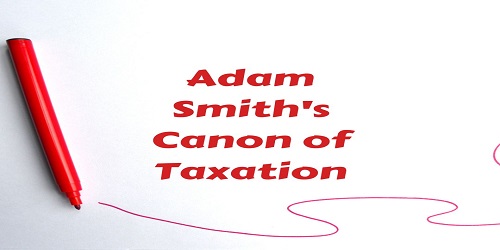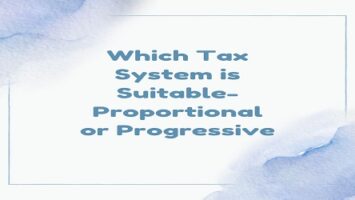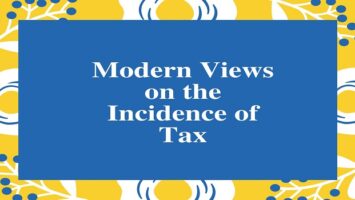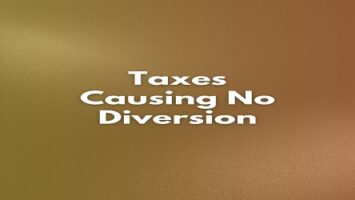Table of Contents
Adam Smith’s Canon of Taxation:
Canon of Equality:
The Canon of equality or equity was started by Adam Smith as, “the subjects of every State ought to contribute towards the support of the government, as nearly as possible, in the proportion of their respective abilities, that is; in proportion to the revenue which they respectively enjoy under the protection of the State. The observation or neglect of the maxim consists of what is called the equality or inequality of taxation. It implies that the income that a person enjoys under the protection of the State, should be taxed on a proportional rate of taxation. Though at another place he pointed out that richer citizens should not pay in proportion to their wealth, but more than in proportion, which means progressive taxation. However, modern economists do not agree with Adam Smith that proportional taxes are equitable and, therefore, they advocate progressive taxation to observe the Canon of equality. Thus, modern economists differ from Adam Smith on means, i.e., the rate of taxation, and not on the objective of taxation.
Canon of Certainty:
The second Canon of Adam Smith is that of certainty, “the tax, which each individual is bound to pay, ought to be certain and not arbitrary. The time of payment, the manner of payment, and the quantity to be paid, ought all to be clear and plain to the contributor, and to every other person….. The certainty of what each individual ought to pay is, in taxation, a matter of so great importance that a very considerable degree of inequality, it appears, I believe from the experience of all nations, is not near so great an evil as a very small degree of uncertainty. The payment of a tax is compulsory and, therefore, its exactation is certain, and hence, it can be said that this cannon is of little importance. It is only theoretically true. But practically, this cannon has not lost its importance, for example, the payment of income tax, its rate and time, all are known and definite to taxpayers and tax officials both, but even then, there are legal court cases between them. It is also not uncommon to see when taxpayers subjected to harassment by tax officials. In fact, there are genuine difficulties in the assessment of a tax, and the Canon of certainty aims at removing all these difficulties so that the revenues to the government may become certain.
Canon of Convenience:
The third canon of Adam Smith is that of convenience, “Every tax ought to be so levied at the time or in the manner in which it is most likely to be convenient for the contributor to pay it.” It implies that taxes should be imposed in such a manner and at the time which is most convenient for the tax-payer, for example, the best time for the collection of land revenue is the time of harvest. Similarly, taxes on the rent of houses should be collected when it is most convenient for the contributor to pay. He also pointed out the reasons and the taxes which can conveniently be collected, i.e., taxes on articles of luxury, “taxes upon such consumable goods, as are articles of luxuries, are finally paid by the consumer and generally in a manner that is very convenient for him.” The payment of these taxes is convenient to the consumer because he pays them little by little, and whoever he likes as he has the freedom to buy them at the most convenient time or not to buy them at all.
Canon of Economy:
The fourth Canon of Adam Smith was that of economy, “every tax ought to be contrived as both to take out and keep out of the pockets of the people as little as possible over and above what it brings into the public Treasury of the state.” This Canon aims as keeping the administrative cost of tax collection minimum, i.e., the difference between the money, which comes out of the pockets of people, and that is deposited in the public treasury should be as small as possible. Adam Smith also pointed out the conditions under which, a tax may either take out or keep out of the pockets of the people more than it brings into the treasury in the following four ways:
(1) In the first place, the levying of it may require a great number of officers, whose salaries may eat up the greater part of the produce of the tax, and whose pre-requisites may impose another additional tax upon the people. Hence, the administrative cost should be minimum.
(2) Secondly, it may obstruct the industry of the people, and discourage them from applying to certain branches of business which might give maintenance and employment to great multitudes. Hence, the taxes should not be so heavy as to discourage production.
(3) Thirdly, the forfeitures and other penalties, which these unfortunate individuals incur, who attempt unsuccessfully to evade the tax, may frequently ruin them, and thereby put an end to the benefit which the community might have received from the employment of their capital. An injudicious tax offers a great temptation to smuggling. Hence the taxes should not be so heavy as to offer great temptation for evasion or smuggling and the taxpayer may not put under unnecessary extra cost.
(4) Fourthly, subjecting to frequent visits and the odious examination of the tax-getters may expose them to much unnecessary trouble, vexation, and oppression. Hence, the tax system should be simple, so that it may not become a cause of trouble and irritation to the tax official.
Some writers, like Bastable, have added a few more cannons of taxation to Adam Smith’s four:
Canon of Productivity:
Bastable laid down his canon of taxation in order of importance. His first canon of taxation is the canon of productivity, i.e., “that in the first place, taxation should have productivity.” It is obvious that Bastable gave the greatest importance to the productivity of a tax. The productivity of a tax may be observed in two ways. In the first place, a tax should yield a satisfactory amount for the maintenance of a government. To put it in the words of Bastable, “the very object for which the revenue system exists is to provide for the maintenance of State and, therefore, the Minister in charge of the finance naturally estimates the merits of a tax by the amount of its yield.” Secondly, taxes should not obstruct and discourage production in the short as well as in the long run.
Canon of Elasticity:
Bastable also laid stress on the principle of elasticity, i.e., the yields of the taxes may be increased or decreased according to the needs of the government. The government may need more funds to face drought and floods, to finance a war or for development purposes, and for other unforeseen reasons also. Government resources can be raised quickly only when its system is elastic. Taxes on property and commodities are not as elastic as income tax.
Canon of Diversity:
There has been a controversy over the comparative advantages of single-tax and multi-tax systems. Various types of single taxes have been proposed. The physiocrats proposed a single tax on the economic rent of land. Similarly, arguments have been advanced for a single tax on income. A single tax may have several drawbacks, i.e., (i) it may not yield sufficient revenue, (ii) the distribution of the burden of taxation may not be satisfactory, (iii) it may be difficult and expensive to collect, (iv) the temptations for evading it may be large. Multiple taxations on the other hand may not possess all these drawbacks. “In general the weight of argument is against a single tax.” Hence, some of the writers have laid great stress on the diversity of taxation. It implies that there have should be all types of taxes, direct and indirect, so that every class of citizen may be called upon to contribute something towards the State’s revenue. A multiple tax system is generally preferable to a single tax system, but too great a multiplicity is not desirable, as it may go against the Canon of economy and productivity. If there are a large number of taxes, each one of them may yield only a small amount of revenue then the cost of collection may be high. However, Dalton suggested relying on few substantial taxes rather than on many.” It is better to rely on few substantial taxes for the bulk of revenue.” Dalton was of the opinion that too many taxes may spoil the efficiency of the administrative system, and hence it is essential to have a limited number of taxes to maintain the efficiency of administration. Supporting the case of multiple taxations, Prof. Arthur Young defined a good tax system as “If I were to define a good tax system it would be that of bearing lightly on the infinite number of points, heavily on none.” But, it should not have regressive effects.
Thus, the burden of taxation should be widely distributed to the entire economy without causing much harm to anyone. Therefore, it is concluded that a good tax system should be based on the principle of multiple taxation without sacrificing the character of productivity and economy.
Canon of Simplicity:
It means that a tax should easily be understood by the tax-payer, i.e., its nature, its aim, time of payment, method, and basis of estimation should all be easily followed by each tax-payer. Obviously, this canon removes several difficulties for the tax-payer, and, therefore, it is in the interest of his convenience. However, it is not very easy to observe this canon in the modern tax system, which has become quite complex in nature.
However, administrative efficiency is an important determinant of a good tax system and this can easily be achieved if the tax system is simple. When there is no difficulty in understanding a tax, tax-payers are not confronted with accounting or administrative, or any other sort of difficulty. And, therefore, the realization of tax revenue becomes easy. Hence, the efficiency of the tax system may improve by following this canon f taxation.
Canon of Expediency:
It implies that the possibility of imposing a tax should be taken into account from different angles, i.e., its reaction upon the taxpayers. Sometimes it is seen that a tax may be desirable and may have most of the characteristics of a good tax, but the government may not find it expedient to impose it, For example, progressive agriculture income tax is very much desirable in India; but it has not been imposed so far in the manner it should have been imposed. Hence, this canon is of vital importance in democratic countries.
Canon of Co-ordination:
In democratic countries, taxes are imposed by Central, State, and Local governments. It is, therefore, very much desirable that there must be coordination between different taxes that are imposed by different taxing authorities. It is very much needed considering the interest of the tax-payer and of the government both, especially in democratic countries.









Comments (No)